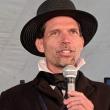A National Revival (Part 1 of 4)
We are considering a national revival in American history that is little known. This revival was first commenced by the preaching of a man named William Miller. In part two of this four-part series, we will consider three additional (see Part 1 for the other similarities) striking similarities between the life of William Miller and those of biblical revivalists such as Moses, Elijah, John the Baptist and Jesus Himself.
4 — William Miller and Farming
In the state of New York where Miller lived, 35% of residents were farmers according to 1850 records. In Bible times, over 90% of people worked the land for food and income. It is not surprising that biblical revivalists were involved in similar labor as Miller.
Miller spent most of his life as a farmer, working the ground while also raising sheep. In 1814 he purchased a parcel of land of about 200 acres. By 1835, 140 acres had been prepared for use and 72 sheep were grazing on his land.
Exodus 3:1 reveals Moses caring for his father-in-law, Jethro’s, sheep. Acts 7:29–30 states that Moses had been working in this capacity with Jethro for forty years when the Lord appeared to him at the burning bush.
5 — William Miller's Maple Grove
Another similarity between Miller’s life and biblical revivalists is that he had a special place on his farm for thought, reflection, and prayer. In his memoirs, this place is described as the maple grove. Often, he would retire here to meditate on the works of nature and Providence. Here he tried to penetrate the meaning, purpose, and future of life on earth.
Perhaps for Moses, his chosen place would be Mount Sinai, also referred to as Mount Horeb or the mountain of God (Exodus 3:1; 19:11). After Moses’ first meeting with God on this mountain, at the burning bush, the same location was selected for future appointments between God and Moses. Several times throughout the book of Exodus we find Moses ascending this mountain to be alone with God. Interestingly, we also find Elijah meeting with God on this same mountain (1 Kings 19).
Jesus also had special places for time in prayer with His Father. John 18:1–2 mentions a garden where He often met with His disciples for prayer. Luke 22:39 reveals this frequented garden was at the Mount of Olives. Mark and Matthew both reveal the name of this garden — Gethsemane (Matthew 26:36-39; Mark 14:32-35).
6 — William Miller's Hesitancy To Accept God's Call
And finally, a third similarity Miller held with biblical revivalists is that he revealed a hesitancy to accept God’s call. Here are a few of his reasons for holding back: (1) fear of misleading anyone; (2) Jesus’ words in Matthew 24:36 stating that no one knows the day or hour of His coming; and (3) being unaccustomed to public speaking, he felt unable to attract crowds. He describes himself as feeling diffident.
For 13 years Miller refused to tell the world of his conviction that Jesus was coming in that generation. Finally, in great distress, he made God a promise. If someone asked him to preach, he would go. Only a half-hour passed before he received his first invitation. Miller was immediately angry, not expecting that anyone would ever ask him. He rebelled and determined not to go. After struggling for about an hour in the maple grove, he finally submitted. If God would sustain him, he would go.1
God met with a similar response when He appeared to Moses in the burning bush. He told Moses that He was sending him to Pharaoh to bring His people out of Egypt. Like Miller, Moses resisted. He did not feel that he was the right person for the job. He didn’t think anyone would believe or listen to him. He told God that he wasn’t eloquent but was slow in speech (Exodus 3:10–4:10).
Psalm 40:7–8 and Hebrews 10:5–7 reveal Jesus’ willingness and even eagerness to do His Father’s will.
Yet in Gethsemane, Jesus’ humanity struggled as He faced bearing the consequences of man’s sin and the breaking of unity with His Father.2
He asked that this cup might be taken away from Him (Matthew 26:39). And yet, as Miller in the maple grove submitted, so in this garden Jesus submitted to His Father, saying, “Your will be done” (Matthew 26:42).
Throughout history God has chosen individuals who lived simple lives, often in poverty, to do great things for Him. These men walked with God, yet the weight of responsibility rested upon them. They felt the greatness of the task before them. There was no self-confidence. Only self-distrust.
Call to Remember
In part three we will consider still more evidence that Miller was God’s chosen revivalist for America in the 1800s. Though we are still waiting for Jesus to come, it is important to see how God has worked in the past to awaken His sleeping church (Matthew 25:1–13). Jesus says, “Go into all the world and preach the gospel” (Mark 16:15). And in Matthew 24:14, “This gospel of the kingdom will be preached in all the world as a witness to all the nations, and then the end will come.”
All scripture taken from the New King James Version®. Copyright © 1982 by Thomas Nelson. Used by permission. All rights reserved.
- Sylvester Bliss, Memoirs of William Miller (Eugene, Oregon: Adventist Pioneer Library, 2014), 80-81, 92-93, 97-98.
- Ellen G. White, The Desire of Ages (Mountain View, California: Pacific Press Publishing Association, 1898), 686-688.




